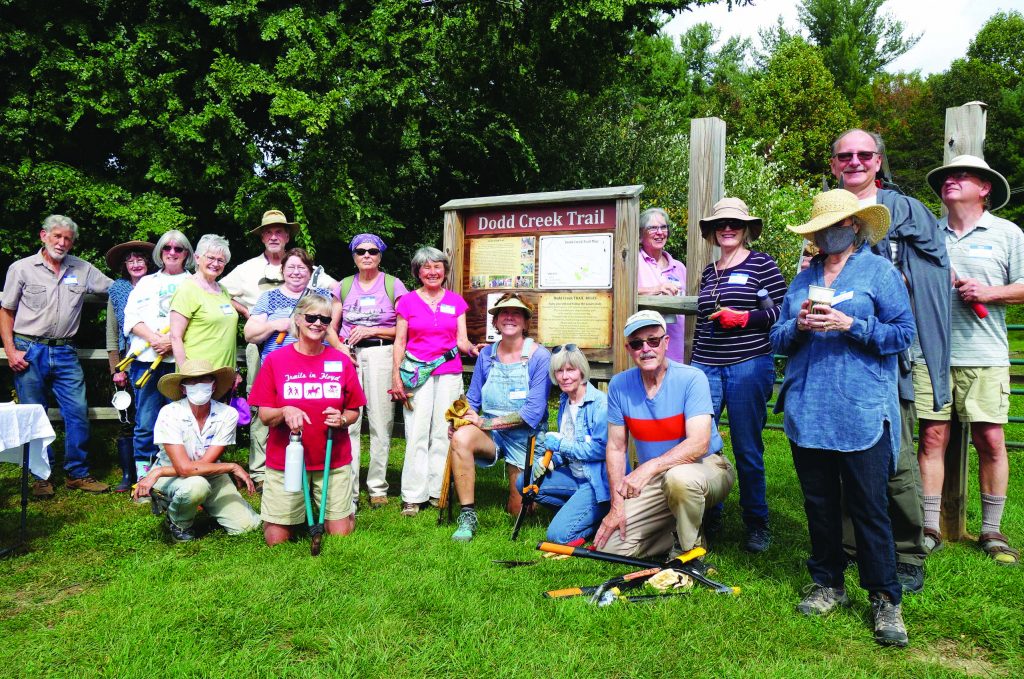
Partnership for Floyd Dodd Creek trail volunteers
The Park Committee Volunteers who worked hard from 2008 to 2014 to design, organize and build the beautiful place we have today. Left to right, back row: Mike Maslaney, Mac Traynham, Woody Crenshaw, Ralph Roe, Randall Wells. Front row: Jack Wall, Jane Cundiff, Betty Lineberry, Anne Pendrak, Karin Grosshans, Dede McGrath, Marjorie Wells, Ellie Roe.
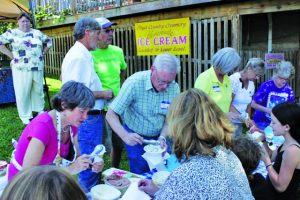 In the spring of 2024, the Partnership for Floyd (PFF) will be celebrating 20 years of civic work in Floyd, and preparations are underway! The first step in these preparations will be to increase recognition of the organization. Most recognized for its development of Warren G. Lineberry Park, as well as the Park-to-Library and Dodd Creek Trails, the non-profit citizen group has also hosted Earth Day and Health Fair events, held fundraisers for its projects, and was influential in the revitalization of downtown Floyd through providing support for government grants and volunteer labor.
In the spring of 2024, the Partnership for Floyd (PFF) will be celebrating 20 years of civic work in Floyd, and preparations are underway! The first step in these preparations will be to increase recognition of the organization. Most recognized for its development of Warren G. Lineberry Park, as well as the Park-to-Library and Dodd Creek Trails, the non-profit citizen group has also hosted Earth Day and Health Fair events, held fundraisers for its projects, and was influential in the revitalization of downtown Floyd through providing support for government grants and volunteer labor.
The Partnership was founded in January of 2004 as a spin-off from the Old Jacksonville Cemetery committee. That committee was formed after the Hotel Floyd property purchase by Jack Wall and Kamala Bauers to assure that the cemetery grounds adjacent to the hotel would be protected during hotel construction. It brought together citizens and business owners, as well as town and county officials, with a vision to preserve and enhance what makes Floyd special. Their goals were also to promote tourism, community development, and town improvements.
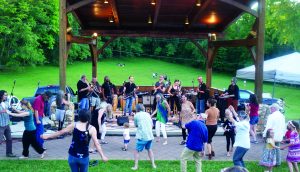 The late Sam Moore, who was the founding PFF Vice President, as well as a former employee of the Virginia Department of Transportation (VDOT), first brought up the idea of applying for a TEA-21 transportation enhancement grant through VDOT. This grant was approved and used to build sidewalks, including a pathway from the hotel to downtown Locust Street. These new walkways served to link up hotel patrons with downtown activities and businesses, including Floyd’s famous Friday Night Jamboree at The Floyd Country Store.
The late Sam Moore, who was the founding PFF Vice President, as well as a former employee of the Virginia Department of Transportation (VDOT), first brought up the idea of applying for a TEA-21 transportation enhancement grant through VDOT. This grant was approved and used to build sidewalks, including a pathway from the hotel to downtown Locust Street. These new walkways served to link up hotel patrons with downtown activities and businesses, including Floyd’s famous Friday Night Jamboree at The Floyd Country Store.
“We were novices and really busy in the beginning,” said Bauers, a founding member of the PFF who initially served as the Partnership’s Project Manager. As Project Manager, Bauers began looking at other communities that were successful in getting redevelopment grants, and she talked to their town managers. She learned that governments need non-profit community partners to qualify for grants. The group applied for and were accepted as a Virginia Main Street Affiliate through Richmond’s Department of Housing and Community Development, after which the members began attending Main Street training events and workshops.
At the time the Partnership was forming, Lydeana Hylton Martin was working for the New River Valley Regional Commission; a commission that identifies needs and seeks funding to meet those needs. As a Floyd native, Lydeana attended an early PFF meeting and offered her expertise, walking members through the grant process. Later that year, she was hired for the newly created Floyd position of Director of Economic Community Development, which she holds to this day.
In an October 2004 Roanoke Times story about Martin’s Floyd position, she commended the volunteer planning work that makes grants possible. “It’s amazing to me, the private citizens that are volunteering their time. To me, they are the heroes that let the grant writer tell that story.”
The twenty-percent local matching funds for the TEA-21 grant didn’t deter the PFF from its goal. House meetings and antique auction fundraisers were held. Wall and Bauers also donated a portion of the Hotel Floyd property to help meet the local matching funds for the grant.
Securing the Main Street Affiliate designation and the TEA grant was followed by efforts to secure downtown Floyd as a designated historic district. Historic preservation officials from Roanoke and Richmond presented an informative historic buildings rehabilitation tax credit workshop. After this, a committee was created to catalogue every historic structure in town, of which there were over two hundred! Taking part in this effort were D.C. architects Cy Markeses and Belynda Reeder, who were working on the green design for the Hotel Floyd. There were also Virginia Tech architect students, as well as The Old Church Gallery local historian, Kathleen Ingoldsby.
“The important thing is that the history of the people who helped build the town and the buildings they created are fully described in the document, and that record has gone on to create the Historical Society’s popular Walking Tour and is available for other historical documents and grants,” Ingoldsby said.
The national and state historic designation made it possible for the town to qualify for, and be approved for, a Virginia Community Development Block Grant (CDBG). The Partnership worked closely with the Town Council and Clerk to explore options for how to use the CDBG grant funds. To encourage input from the community, the Woman’s Club hosted an information panel of eleven local businesses and agencies that was moderated by Martin. Martin also reviewed citizen survey results at a Chamber of Commerce meeting. Mass mailings, a public hearing, and fundraisers were held and a Block Grant management team was formed.
The CDBG grant funds provided business façade improvements, gateway signs, downtown sitting areas, and the parking lot along Locust Street, which has become a key component to the downtown revitalization, benefitting businesses and residents. Also drawing visitors to what Floyd has to offer are the beautiful landscapes, farms, artisans, musicians, mountain traditions, and Floyd’s do-it-yourself entrepreneurial spirit.
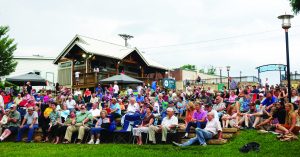
The town comes out to hear Wayne Henderson and Helen White play a Small Town Summer event.
In a 2019 guest column for Blue Ridge Country Magazine, Floyd’s current Mayor, Will Griffin, wrote an article about how the changes in Floyd have benefited the community. He wrote about Floyd’s accessibility to The Blue Ridge Parkway, the resurgence of old time and bluegrass music, the Floyd Country Store as a noted venue on Virginia’s Crooked Road Heritage Music Trail, and the growing success of Floydfest, which has solidified Floyd’s position as a music destination.
“We have created a vibrant tourist economy without giving up who we are,” wrote Griffin, who attended the first PFF meeting before he was the town mayor.
Every town needs a park, and to date, the Warren G. Lineberry Park has been the Partnership’s biggest undertaking. After the town of Floyd purchased the 2.7 acres of park land from the Lineberry family in 2006, the PFF reintroduced antique auctions and appraisals, and they hosted an ice cream social to raise money to build the amphitheater stage that graces the property today. The town provided additional funds and the children’s playground, as well as the seating areas. The PFF gathered community input, organized projects, and brought volunteers and professionals together to get the job done.
During the whole project, the community stepped up. Phoenix Hardwoods donated handcrafted wooden benches. Swede McBroom donated a hand-crafted picnic table. Floyd County High School students worked with local musicians, Mack and Jenny Traynham, on the gazebo music shelter that was designed, coordinated, and donated by the Traynhams. The entrance sign for the park and the specially designed lights were built and donated by Woody and Jackie Crenshaw and the folks at Crenshaw Lighting.
To date, Lineberry Park has been the site of picnics, live music events, a Floyd CARE Juneteenth Celebration, The Floyd Small Town Summer concert/movie series, a Christmas Tree Lighting event, and more.
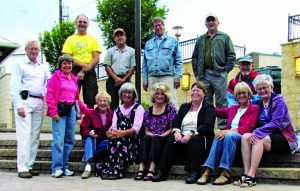 Martin recently recalled the work that the PFF has done over the years for “the good of many,” including when the group funded an educational and publicly-viewed water video that one of her interns created to raise awareness about the complexity and vulnerability of Floyd ground water.
Martin recently recalled the work that the PFF has done over the years for “the good of many,” including when the group funded an educational and publicly-viewed water video that one of her interns created to raise awareness about the complexity and vulnerability of Floyd ground water.
Griffin, who noted that tourism dollars reduce the tax burden on local tax payers, credited the Block Grant as “the most important thing to happen to Floyd since I’ve been involved in town government, which has been over thirteen years.”
On a recent Saturday, while sitting on the Dogtown Roadhouse deck which overlooks the Lineberry Park, Bauers enjoyed lunch as she watched families enjoying the park. “People came together and did this,” she said. “It really has been a partnership.”
The Partnership, awarded Floyd’s Nonprofit of the Year by the Chamber of Commerce in 2021, meets the fourth Monday of each month and is continuing their work developing educational walking trails and planning for a Spring Health Fair. Flower Power, a new offshoot of the PFF, has been busy beautifying the town with flower plantings and painted murals. All are welcome.
The Partnership for Floyd
www.PartnershipForFloyd.Wordpress.com

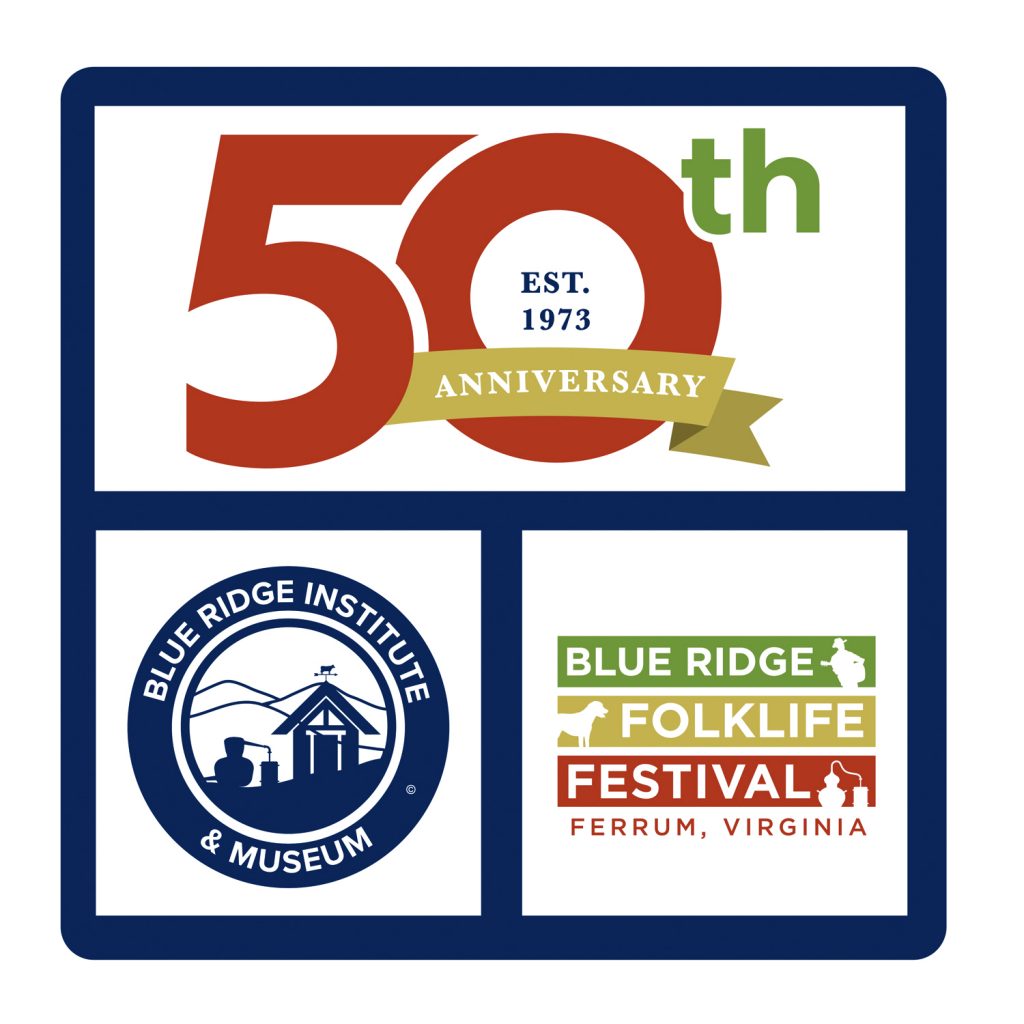
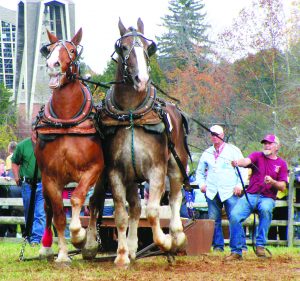
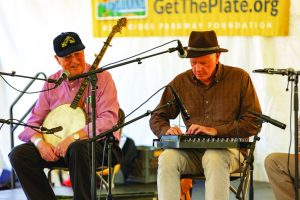 The same year BRIM was established, the legendary Blue Ridge Folklife Festival also began. A celebration of Blue Ridge traditions, the festival is still taking place today, rather than remaining a thing of the past. This annual one-day event has been called, “thoroughly authentic” by The New York Times. It consists of four stages featuring old-time, bluegrass, and country music. It also has coon dog water races, mule jumping, draft horse pulling, handmade crafts, moonshine tastings, and delicious traditional foods like fried apple pies. There is a children’s game area and an enormous car show, as well as tractor and small engine demonstrations. The Blue Ridge Folklife Festival is a celebration like no other.
The same year BRIM was established, the legendary Blue Ridge Folklife Festival also began. A celebration of Blue Ridge traditions, the festival is still taking place today, rather than remaining a thing of the past. This annual one-day event has been called, “thoroughly authentic” by The New York Times. It consists of four stages featuring old-time, bluegrass, and country music. It also has coon dog water races, mule jumping, draft horse pulling, handmade crafts, moonshine tastings, and delicious traditional foods like fried apple pies. There is a children’s game area and an enormous car show, as well as tractor and small engine demonstrations. The Blue Ridge Folklife Festival is a celebration like no other.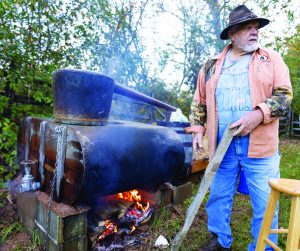 Since its inception, BRIM has grown to include three main divisions. First is the Blue Ridge Institute, which houses the main collection of historical artifacts, including but not limited to the most extensive collection of moonshine stills and still parts on the East Coast. Second is the Blue Ridge Heritage Archives and third is the Blue Ridge Farm Museum. These three departments work together to present a thorough and thoughtful representation of the Blue Ridge region.
Since its inception, BRIM has grown to include three main divisions. First is the Blue Ridge Institute, which houses the main collection of historical artifacts, including but not limited to the most extensive collection of moonshine stills and still parts on the East Coast. Second is the Blue Ridge Heritage Archives and third is the Blue Ridge Farm Museum. These three departments work together to present a thorough and thoughtful representation of the Blue Ridge region. The exhibition galleries are the only such facilities in Virginia dedicated to the presentation of regional, traditional culture and they are dedicated to displaying BRIM’s vast collection of artifacts. BRIM is one of the few small museums left that creates its own exhibits, combining contemporary and historical folk arts and traditions. Selected exhibits even travel throughout The Commonwealth. The most recent exhibit produced by the Blue Ridge Institute & Museum is Souvenirs of Virginia: Travelers’ Trinkets. This is the first exhibit in the state focusing on the history of souvenirs. Filled with over 1,500 artifacts, Travelers’ Trinkets has a little something for everyone.
The exhibition galleries are the only such facilities in Virginia dedicated to the presentation of regional, traditional culture and they are dedicated to displaying BRIM’s vast collection of artifacts. BRIM is one of the few small museums left that creates its own exhibits, combining contemporary and historical folk arts and traditions. Selected exhibits even travel throughout The Commonwealth. The most recent exhibit produced by the Blue Ridge Institute & Museum is Souvenirs of Virginia: Travelers’ Trinkets. This is the first exhibit in the state focusing on the history of souvenirs. Filled with over 1,500 artifacts, Travelers’ Trinkets has a little something for everyone.
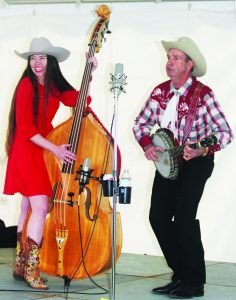 The Blue Ridge Heritage Archive preserves documents, images, and recordings significant to the folk culture of Virginia. The Archives house approximately two-thousand field tapes, three-thousand commercial recordings in CD, LP, 45, and 78 formats, seven-hundred cassettes, eight-thousand photographs, twelve-thousand slides, thirty-thousand negatives, eight-hundred reference publications, and hundreds of original manuscripts. Archival ‘gems’ include the Galax Old-Time Fiddlers Convention tapes, the vast Elmer Smith Collection of Shenandoah Valley folklore, the Lornell Collection of Virginia African American folk music, and the recently acquired Dorothy Cundiff collection.
The Blue Ridge Heritage Archive preserves documents, images, and recordings significant to the folk culture of Virginia. The Archives house approximately two-thousand field tapes, three-thousand commercial recordings in CD, LP, 45, and 78 formats, seven-hundred cassettes, eight-thousand photographs, twelve-thousand slides, thirty-thousand negatives, eight-hundred reference publications, and hundreds of original manuscripts. Archival ‘gems’ include the Galax Old-Time Fiddlers Convention tapes, the vast Elmer Smith Collection of Shenandoah Valley folklore, the Lornell Collection of Virginia African American folk music, and the recently acquired Dorothy Cundiff collection. The Institute fills an important gap in cultural documentation and programming in western Virginia as a regional asset, expanding public awareness of folklife. Currently, the Institute has partnered with Franklin County and the Warren Historical Society to create the Franklin County African American Heritage Trail which will document the significance and contributions of African Americans in the county. Folkways, of course, are ever changing, and the Blue Ridge Institute & Museum works to highlight both the historic and the contemporary.
The Institute fills an important gap in cultural documentation and programming in western Virginia as a regional asset, expanding public awareness of folklife. Currently, the Institute has partnered with Franklin County and the Warren Historical Society to create the Franklin County African American Heritage Trail which will document the significance and contributions of African Americans in the county. Folkways, of course, are ever changing, and the Blue Ridge Institute & Museum works to highlight both the historic and the contemporary.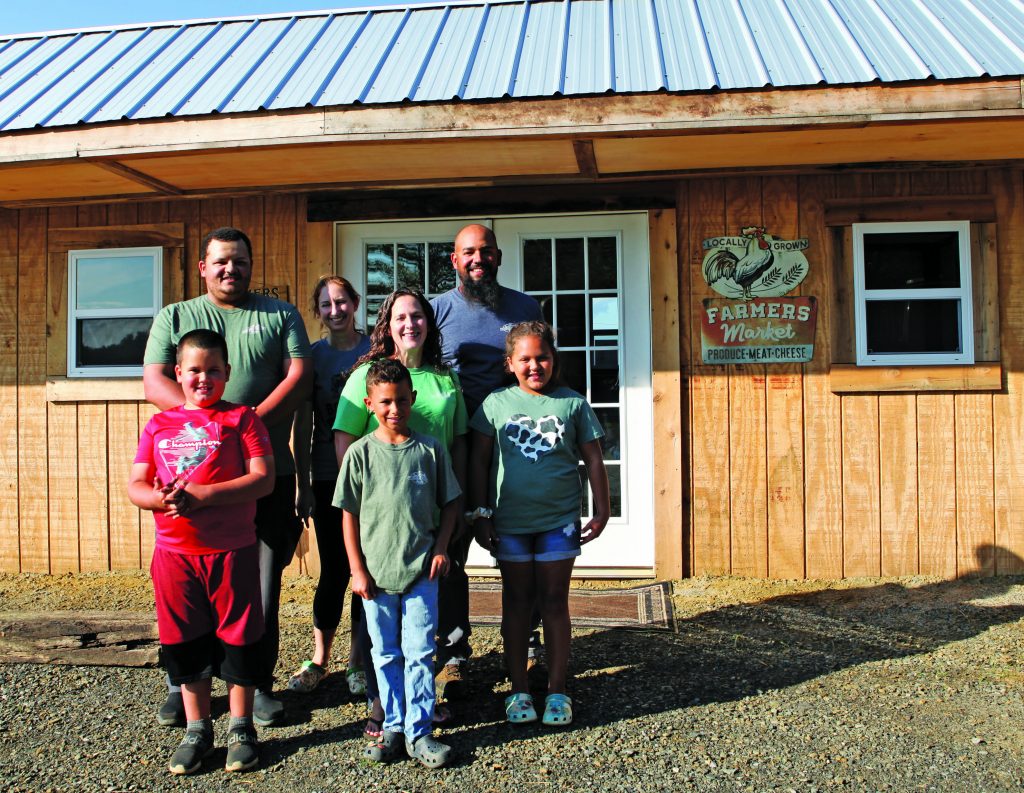
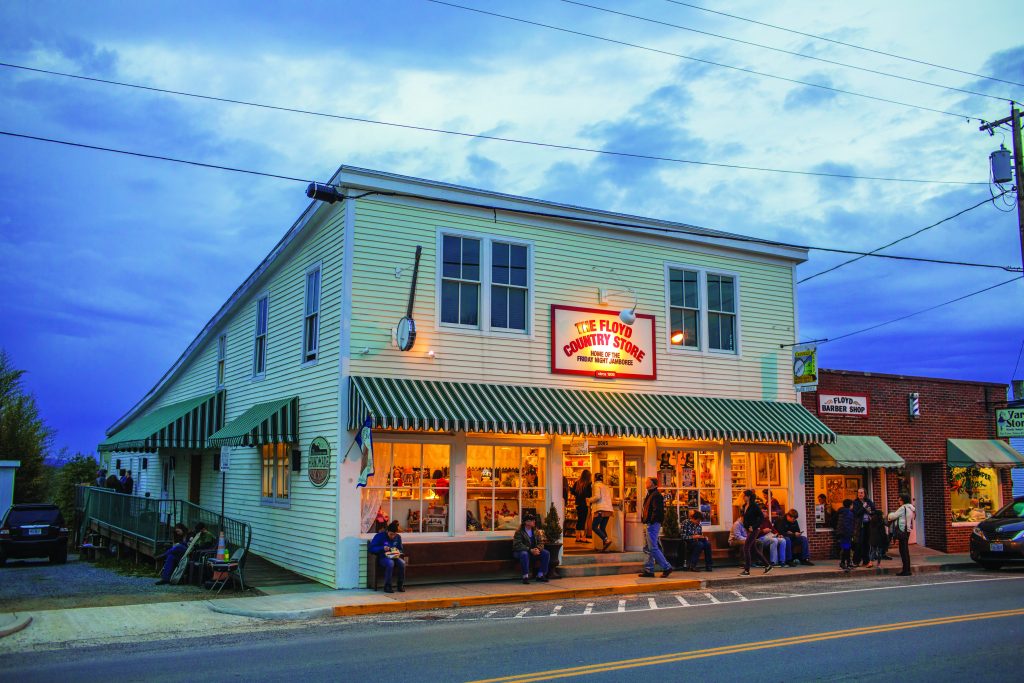
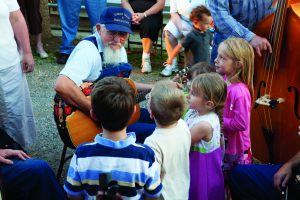 Since purchasing the Country Store from Jackie and Woody Crenshaw eight years ago, Krantz says, “We’ve been real careful to keep as much as we can the same for our customers and community over the last eight years.” The Floyd Country Store has been a beloved music venue and community center for generations, and Krantz and Locke have taken care to preserve its warm atmosphere and musical traditions.
Since purchasing the Country Store from Jackie and Woody Crenshaw eight years ago, Krantz says, “We’ve been real careful to keep as much as we can the same for our customers and community over the last eight years.” The Floyd Country Store has been a beloved music venue and community center for generations, and Krantz and Locke have taken care to preserve its warm atmosphere and musical traditions. 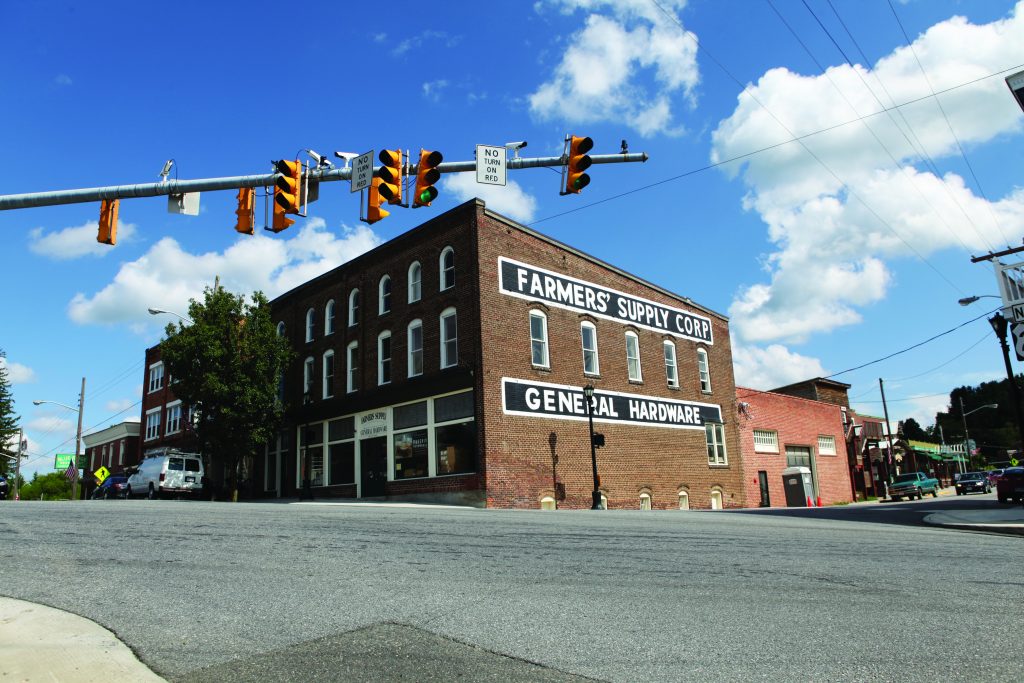
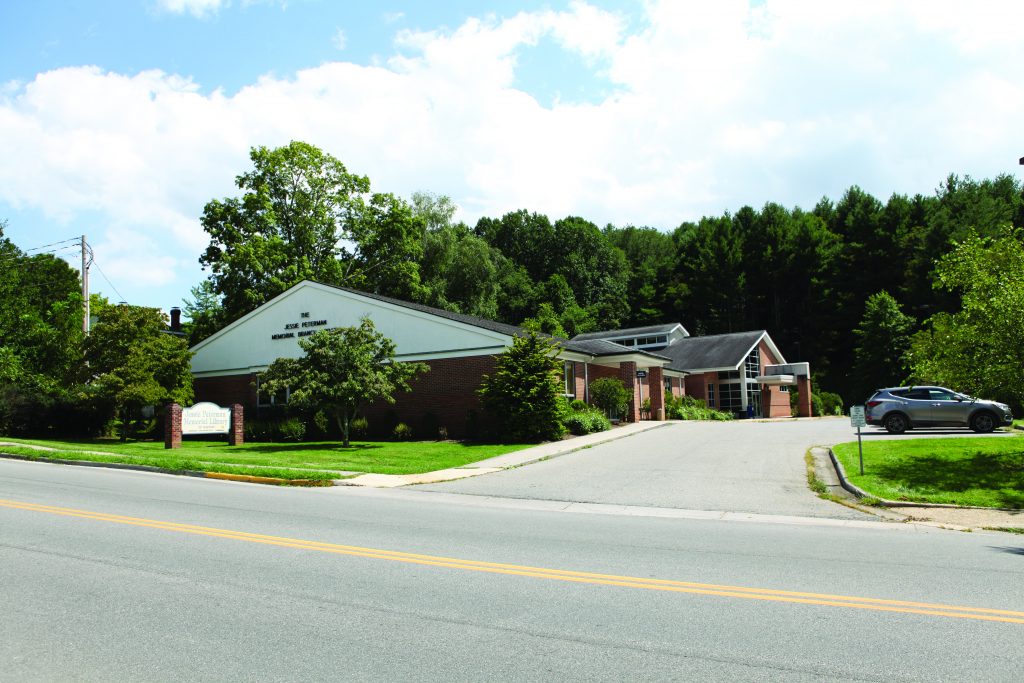
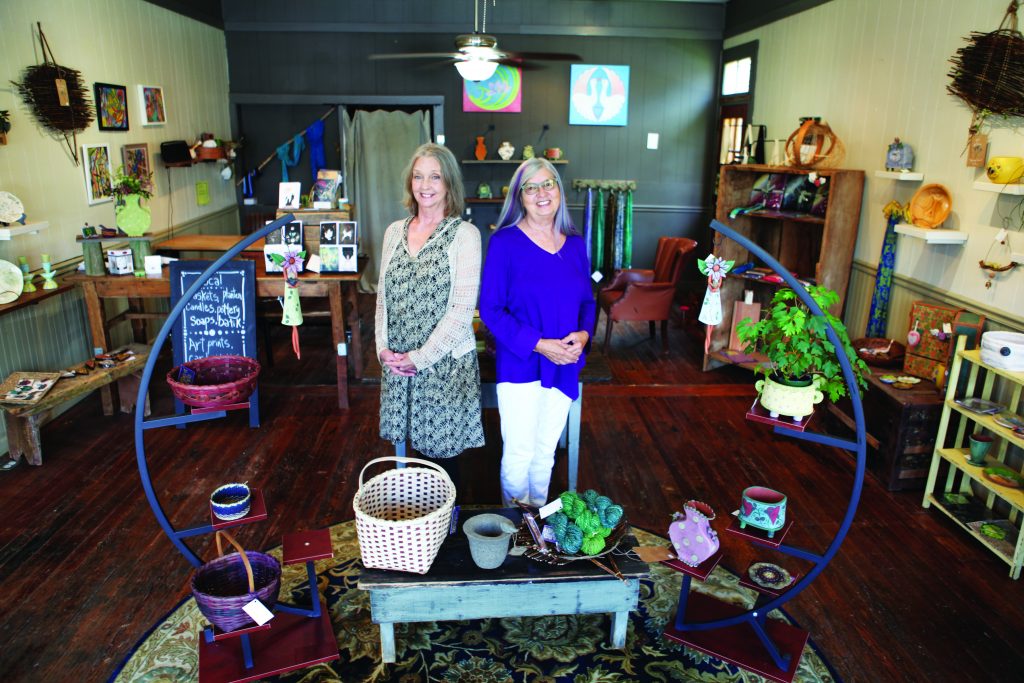
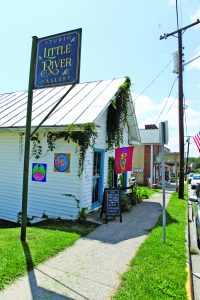 Before even crossing the threshold, the pleasant exterior communicates the inviting nature of Little River Gallery. The unassuming little white building features a lovely garden of blooming flowers in the front, watching over a bowl of water lovingly provided for Floyd’s thirsty fur-babies. There’s even a bench where folks cat ‘sit a spell’.
Before even crossing the threshold, the pleasant exterior communicates the inviting nature of Little River Gallery. The unassuming little white building features a lovely garden of blooming flowers in the front, watching over a bowl of water lovingly provided for Floyd’s thirsty fur-babies. There’s even a bench where folks cat ‘sit a spell’.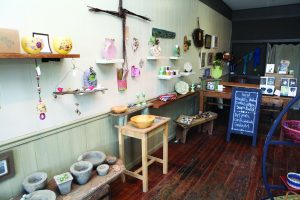 Adding a greenhouse to her homestead has allowed Mary to extend the growing season for her crops, affording her the opportunity to be even more independent, a major lifestyle choice that Mary embraces.
Adding a greenhouse to her homestead has allowed Mary to extend the growing season for her crops, affording her the opportunity to be even more independent, a major lifestyle choice that Mary embraces. In the 1990’s, Judy had the opportunity to apprentice with a North Carolina Heritage Award winning basket maker named Thurman Strickland. He taught the old ways of finding the perfect oak or ash tree in the woods, as well as the process involved with turning it into a strong, functional basket. For many years, MacPhail made and sold her baskets in local shops and galleries, and now displays her collections proudly at Little River.
In the 1990’s, Judy had the opportunity to apprentice with a North Carolina Heritage Award winning basket maker named Thurman Strickland. He taught the old ways of finding the perfect oak or ash tree in the woods, as well as the process involved with turning it into a strong, functional basket. For many years, MacPhail made and sold her baskets in local shops and galleries, and now displays her collections proudly at Little River.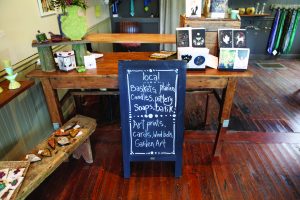 Little River Gallery includes the works of other local artists as well. There are succulent planters created by hypertufa artist Linda Hearn, as well as beeswax luminaries by Anita Brandon. Stained glass pieces by Joanna Huff are perfect for decorating any garden while the colorful, joyous barn quilt paintings by Kathleen Dawe can be displayed indoors or out.
Little River Gallery includes the works of other local artists as well. There are succulent planters created by hypertufa artist Linda Hearn, as well as beeswax luminaries by Anita Brandon. Stained glass pieces by Joanna Huff are perfect for decorating any garden while the colorful, joyous barn quilt paintings by Kathleen Dawe can be displayed indoors or out.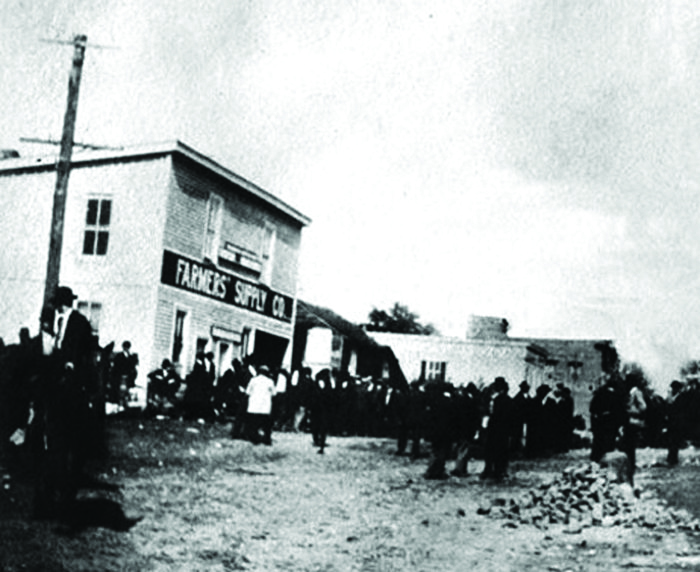
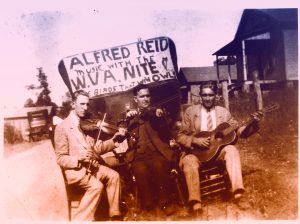 Music of Our Mountains is a free educational resource that explores the rich, disparate roots of traditional Appalachian ‘mountain music’ as well as the characters, cultures, and conditions from which it emerged. The project website, musicofourmountains.com, is a living document made up of recordings, photographs, stories, scholarly texts, and maps. (left: Alfred Reid and fellow musicians) These resources work together to provide an exciting and vivid understanding of the music that the Handmade Music School strives to preserve.
Music of Our Mountains is a free educational resource that explores the rich, disparate roots of traditional Appalachian ‘mountain music’ as well as the characters, cultures, and conditions from which it emerged. The project website, musicofourmountains.com, is a living document made up of recordings, photographs, stories, scholarly texts, and maps. (left: Alfred Reid and fellow musicians) These resources work together to provide an exciting and vivid understanding of the music that the Handmade Music School strives to preserve. 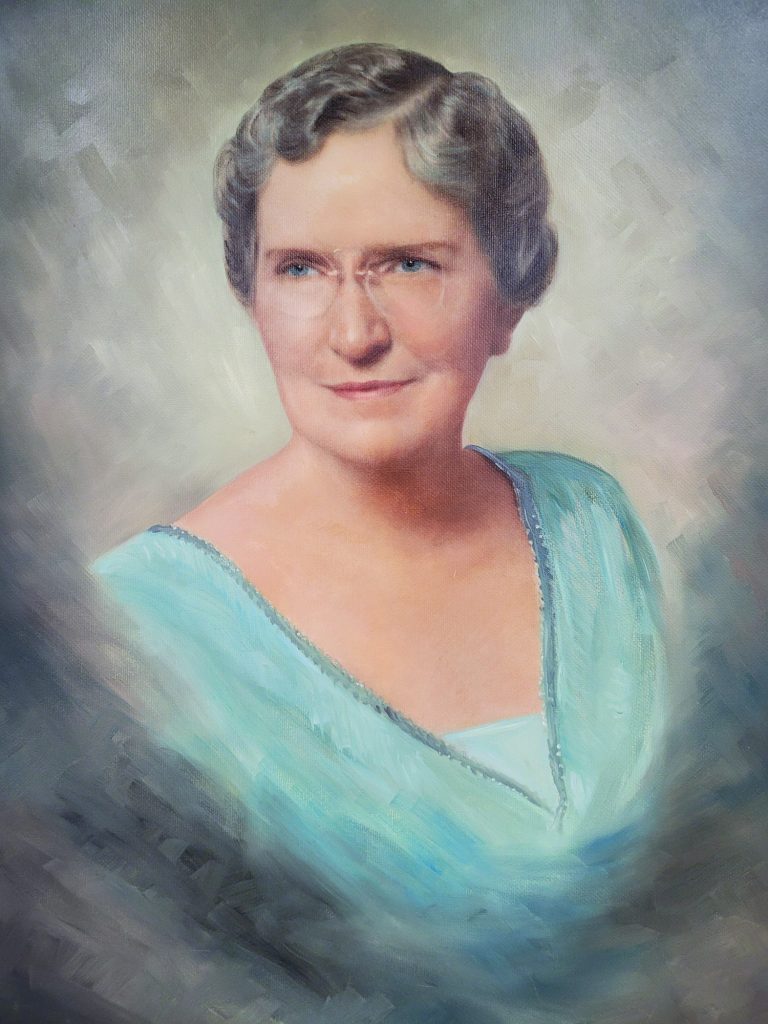
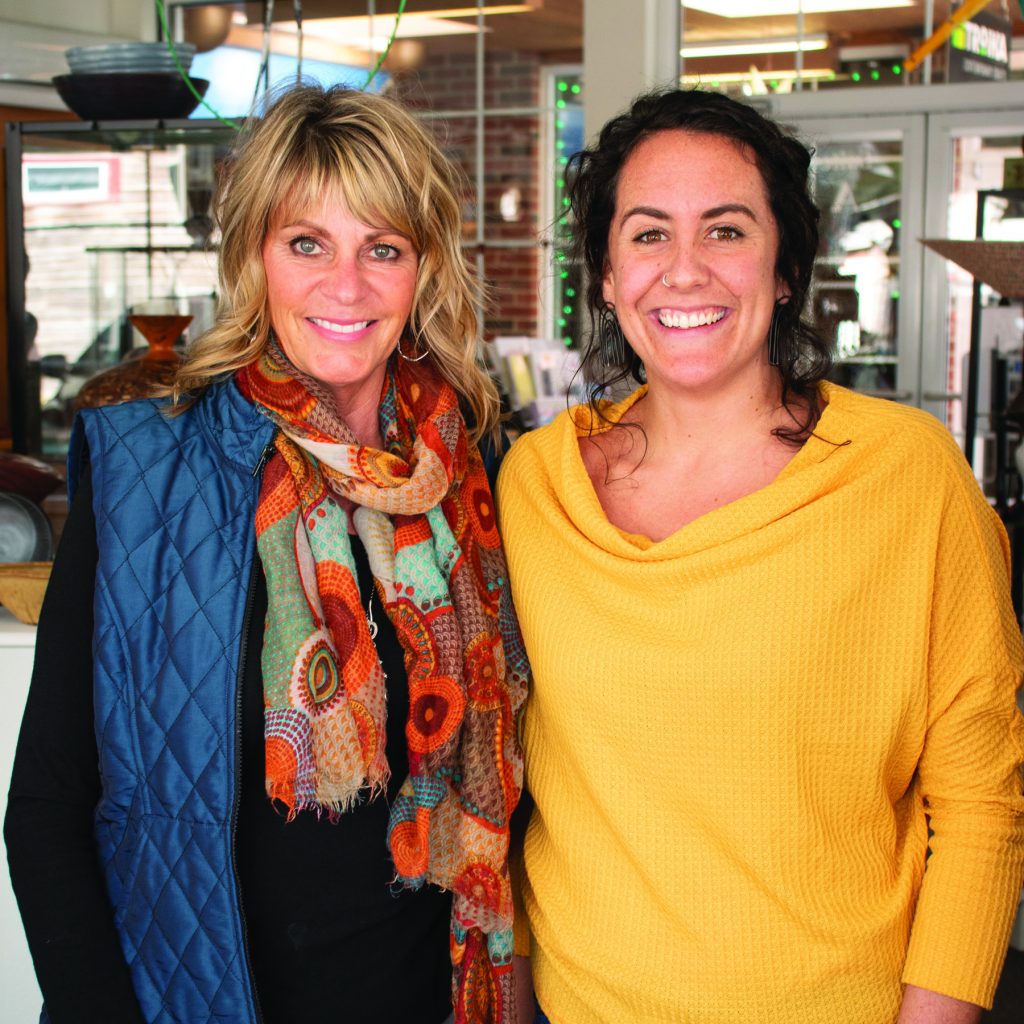
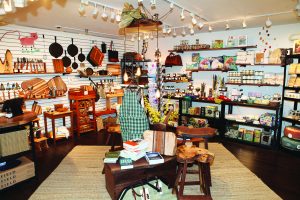 In 2020, the ladies also signed a lease on another space, just down the hall. They wanted to expand to add gift and home items that were not specifically crafts, but the existing space was already filled. The new space would be called Troika Home, and it would be a companion space to Troika Contemporary Crafts. Unfortunately, they signed the lease just before the lockdown’s happened. (Troika Home located at the back of the Station)
In 2020, the ladies also signed a lease on another space, just down the hall. They wanted to expand to add gift and home items that were not specifically crafts, but the existing space was already filled. The new space would be called Troika Home, and it would be a companion space to Troika Contemporary Crafts. Unfortunately, they signed the lease just before the lockdown’s happened. (Troika Home located at the back of the Station)